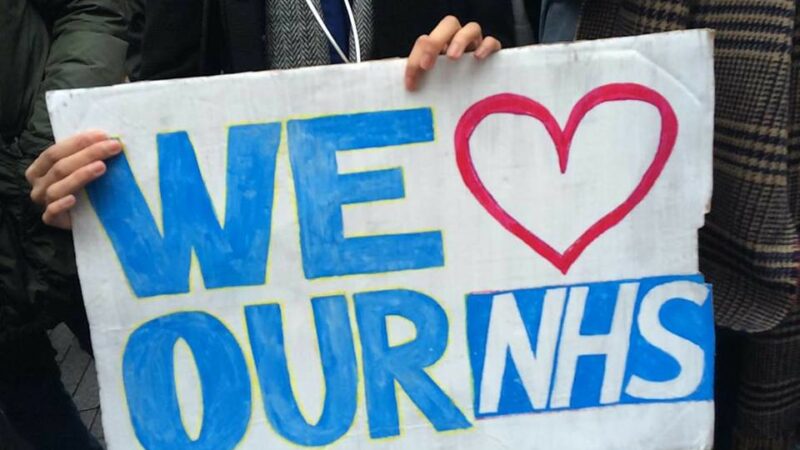'The NHS has been one of the greatest social achievements. Its existence, as known, is under threat.'

Prem Sikka is an Emeritus Professor of Accounting at the University of Essex and the University of Sheffield, a Labour member of the House of Lords, and Contributing Editor at Left Foot Forward.
The Conservative government’s neglect of the National Health Service (NHS) has taken a terrible toll on people. So far, 128,000 deaths have been attributed to the coronavirus pandemic. Many more have died because the NHS lacked capacity and their treatment was postponed. Only the heroic efforts of the NHS staff have kept down the death toll.
Rather than learning lessons, the UK government is relentlessly pursuing its ideological project of privatising the NHS and handing it over to corporations.
The NHS was founded in 1948 upon key principles of non-profit making, public service and universal access to a family doctor. The Conservatives voted 21 times against the legislation. The British Medical Association opposed it and to this day general practitioners (GPs) operate as private businesses. They are not directly employed by the NHS and are paid through a complex contract.
Large parts of the UK healthcare system, such as dentistry, opticians and pharmacies, remained in private hands. The Health and Social Care Act 2012 promoted market-based competition, patient choice and handed large contracts to corporations. Healthcare has become just another commodity in the corporate bazars.
NHS as a Profit Centre
GPs can operate though limited liability companies and that has enabled multinational corporations to take charge of local services.
AT Medics acquired control of 49 surgeries and related services. It had some 375,000 patients. For the years 2016-2020, it reported profits of £28.4m, which instead of being used for patient welfare went into the pockets of its shareholder directors. Earlier this year, US conglomerate Centene Corporation took over control of AT Medics Limited’s GP surgeries. Its subsidiary Operose Health also operates surgeries throughout England and this group alone now controls 530,000 patients. In the US, Centene has paid out large amounts to settle allegations of fraud, deceptive sales and marketing practices.
Patient data is a goldmine for corporations. It has been given away without direct approval from patients. The data can be used to build profiles of patients and target them for health products, insurance and even denying healthcare. Profit, not the patient’s health, is the key aim of corporations. The profits can be increased by reducing access to GPs and by denying life-saving drugs to patients.
Gifts to Corporations
The General Practice Data for Planning and Research initiative launched by the government will enable it to collect and pool the medical data of 55 million patients in England. The rhetoric is that this will help to improve the delivery of health services. The government has assumed that all patients have consented unless they take specific steps to opt-out before 1st September 2021 by using a form available at the NHS website. People have not received any letter from the government or their GPs to inform them of their rights. This pooling of data will be irreversible. The anonymised data will be shared with health service providers, academics and market research firms who may build patients profiles and constrain the availability of life-saving medicines and support to individuals and localities not considered to be profitable.
Even entire hospitals have been handed over to corporations, with disastrous results for patient care. Front line services, such as physiotherapy, mental health, blood-testing, cataract and hip and knee replacements have been outsourced to corporations. Cataract operations carried out by private operators are typically 50-100% more expensive than the NHS.
This in turn depletes the NHS of cash and limits its capacity to reduce waiting lists and provide required services. Over the last decade, some £96bn of the NHS budget has been handed over to non-NHS providers of healthcare. Virgin Care has around 400 health and social care contracts and treated around one million patients. It pays no corporation tax on its UK profits.
The government’s white paper published in February 2021 will make digital platforms a priority. These are controlled by large corporations. Access to GP will depend upon how well anyone can negotiate with symptom checks embedded in artificial intelligence systems. This is bad news for millions of people who can’t afford computers or broadband. The universal access to a GP will disappear. The government will soon introduce a Bill to implement the changes. Of course, the rich will always have the money to take out health insurance and have face-to-face meeting with doctors.
The above developments rarely form part of ministerial speeches. People are comforted with the claims that the NHS will remain free at the point of delivery. However, it will be a pale-shadow of its former self. It is offering fewer services. The waiting lists are getting longer. Access to a GP will not be universal. Profits, not need, will determine access to healthcare. Profits for corporations will inevitably result in a lower spend on frontline services. People will have to pay higher taxes for lower services.
The NHS has been one of the greatest social achievements. Its existence, as known, is under threat. It can only be saved by collective action by the people. Resistance to the forthcoming Bill will probably be the last chance to save the NHS.
Left Foot Forward doesn't have the backing of big business or billionaires. We rely on the kind and generous support of ordinary people like you.
You can support hard-hitting journalism that holds the right to account, provides a forum for debate among progressives, and covers the stories the rest of the media ignore. Donate today.



